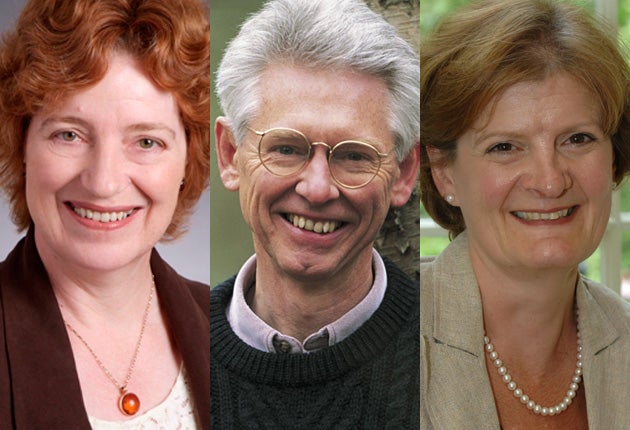City pay culture has spread to charities, union says
Research shows that more than 50 bosses earn in excess of £100,

The leaders of Britain's charities face accusations that their six-figure pay packets are excessive and part of a culture of greed polluting the voluntary sector.
Research seen by The Independent shows that more than 50 charity chief executives received between £100,000 and £210,000 last year. In one case, a charity paid its chief executive nearly £400,000.
Unite, the union which represents 60,000 charity workers, said too many charity bosses were paying themselves more than the Prime Minister's salary of £197,000.
Rachael Maskell, Unite's national officer for the not-for-profit sector, said: "The excessive City pay culture is seeping into the remuneration packages of charity bosses and should be curbed. This is to be deplored, as it corrupts the ethos of the voluntary sector and is an insult to those, often on average incomes, who donate to charity.
"I think the general public will be shocked by the scale of the packages that some executives are being awarded. This sector is losing its sense of what real value is."
But Unite's attack on charity pay immediately drew a fierce response from the organisation representing charity chief executives.
Stephen Bubb, chief executive of the Association of Chief Executives of Voluntary Organisations (ACEVO), accused the union of gross hypocrisy over the issue of pay. He said: "We were not surprised to see that the joint general secretaries of Unite earn a combined package of £308,000. They are running a complex organisation with millions of members and a broad range of stakeholders, just like other third-sector leaders.
"To mention third-sector CEO remuneration in the same breath as City pay is insulting – a cheap shot at people running serious organisations in a time of social crisis." He added that the union did not realise that top charities needed to attract "high-calibre" candidates to run modern and sophisticated organisations.
"Unite seems to think the charity sector is stuck in the Victorian age, where our organisations are run by volunteers who rely on jumble sales and raffles – we have moved on from those days."
He said his organisation's research showed that 28 per cent of charity chief executives have experienced a remuneration freeze in response to economic conditions over the last year, while the pay of chief executives of smaller charities fell by an average of 9 per cent.
"The CEOs of the sector left to mop-up the effects of recession have taken a responsible path. It seems that they and the organisations they represent are shouldering much of the financial burden of the recession," said Mr Bubb.
But the survey also revealed that more than 200 members of ACEVO earned more than £70,000 last year. While the overall pay levels had fallen from last year, the median total salary of chief executives had risen by about £8,000 over the last six years to £57,264.
Unite is calling for charities to look closely at the rates of pay of all their employees and to iron out inequalities. According to a recent Charity Commission report, 17 per cent of charities had experienced rising demand for their services during the recession, while 31 per cent reported a drop in income from grants and 26 per cent experienced a decrease in fund-raising income.
Last night, the Commission said it was the responsibility of trustees to set the salaries of their organisation's employees, including the chief executive.
A spokeswoman said: "These decisions should be based on a reasonable and prudent management process. There are almost 180,000 registered charities in England and Wales, ranging from small, local organisations to large charities working around the world. This diversity is reflected in the salaries of charity employees."
High earners: Charity bosses
*Riverside Housing Group: Deborah Shackleton, chief executive, received a salary of £231,000 for 2008-9.
* Barnardo's: Its chief executive, Martin Narey, earns a salary of £166,532.
*National Trust: Fiona Reynolds, the director general, is paid between £160,000 and £169,000.
*British Heart Foundation: Peter Hollins, chief executive, enjoys a salary of £153,000
*Action for Children: Its boss Clare Tickell was paid between £130,000 and 140,000 last year.
*Guide Dogs for the Blind: Bridget Warr, chief executive, earns between £120,000 and £130,000.
*Age Concern: Its director general Gordon Lishman earned £117,488 in 2007-8.
*RSPCA: Mark Watts, chief executive, received £105,500 in pay and perks in the year to April 2009.
*The RSPB: Chief executive Graham Wynne's pay and benefits were up to £100,000 for 2007-8.
*Victim Support: Gillian Guy, the group's chief executive, earns a salary of £100,000.
*World Vision: Justin Byworth, the chief executive, received £99,994 in pay and perks in 2008.
*Greenpeace: The current salary of the organisation's chief executive, John Sauven, is £65,000.
The following charities were contacted by The Independent but refused to name their highest earners:
*NSPCC – highest earner received pay and perks of between £110,001 and £120,000 in 2009.
*Anchor Trust – Jane Ashcroft, deputy chief executive, stepped in as acting chief executive after the resignation of John Belcher who earned nearly £400,000. The charity said it did not know who will be the permanent replacement and how much they will be paid.
Subscribe to Independent Premium to bookmark this article
Want to bookmark your favourite articles and stories to read or reference later? Start your Independent Premium subscription today.

Join our commenting forum
Join thought-provoking conversations, follow other Independent readers and see their replies